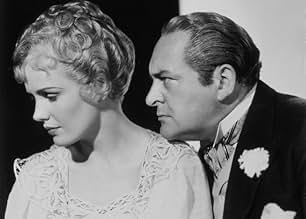Añade un argumento en tu idiomaAn ambitious lumberjack abandons his saloon girl lover so that he can marry into wealth, but years later becomes infatuated with the woman's daughter.An ambitious lumberjack abandons his saloon girl lover so that he can marry into wealth, but years later becomes infatuated with the woman's daughter.An ambitious lumberjack abandons his saloon girl lover so that he can marry into wealth, but years later becomes infatuated with the woman's daughter.
- Ganó 1 premio Óscar
- 1 premio y 1 nominación en total
- Tony Schwerke
- (as Frank Shields)
- Restaurant Patron
- (sin acreditar)
- Diner
- (sin acreditar)
- Gunnar Gallagher
- (sin acreditar)
- Dining Car Patron
- (sin acreditar)
- Lumberjack
- (sin acreditar)
- Thomas Gubbins
- (sin acreditar)
Argumento
¿Sabías que...?
- CuriosidadesHoward Hawks's take on his being "fired" is that he wasn't. Rather, he quit, after refusing to agree with Samuel Goldwyn, who wanted the narrative to stay closer to that of the book. Goldwyn had been ill and absent for the 42 days of shooting that Hawks directed and was unaware of Hawks' rewrites. Hawks left the production with only 14 days left to go.
- PifiasDuring the early montage showing the lumber process, fluorescent lights are seen on the ceiling of a workshop. While they had just become commercially available when the film was made, this scene takes place in 1884, decades before their refinement.
- Citas
Swan Bostrom: You.. you love him Lotta...
Lotta Morgan: What do you think?
Swan Bostrom: I think... I think... I think I have another drink.
Lotta Morgan: Hey you better leave some of that for Barney.
Swan Bostrom: I ain't have to. He ain't comin' back.
Lotta Morgan: What did you say?
Swan Bostrom: That's what I tried so hard to tell you and it yust slip out...
- ConexionesEdited into Sunset in Wyoming (1941)
- Banda sonoraAura Lea
(1861) (uncredited)
Music by George R. Poulton
Lyrics by W.W. Fosdick
In the score often as Lotta's theme
Performed by Frances Farmer and an unidentified quartet in LeMaire's bar
Reprised later by her, Edward Arnold and Walter Brennan
Based on the sprawling novel by Edna Ferber, COME AND GET IT is a fascinating love story, filled with action & tenderness and some very good acting. The production values are on a high order, with the authentic logging sequence especially exciting.
Boisterous, brash & bold, Edward Arnold portrays the brawling two-fisted lumberjack who pushes himself to the top of the heap, trampling on his one great love in the process. Although completely unbelievable as a young man during the first three-quarters of an hour, this is not a problem as he is never anything less than enjoyable in the role.
Miss Frances Farmer, playing a tenderhearted floozy and her own ambitious daughter, has the best film of her career. She is nothing less than radiant and her obvious talent makes her bizarre personal history all that much more tragic.
Wonderful Walter Brennan plays Arnold's jovial Swedish pal, in a performance that would catapult him out of cinematic anonymity and earn him the first of his three Oscars for Best Supporting Actor. Seemingly able to play any kind of part - as long as the character was middle-aged or elderly - during his 46 years in movies & television Mr. Brennan would become one of America's most beloved character actors. He died in 1974 at the age of 80.
Almost obscured by the oversized talents around him, Joel McCrea wisely turns in an understated performance as Arnold's quiet, intelligent son (he invents the disposable paper cup!). His years of solid successes in front of the cameras were adding up and he would soon become a major Hollywood star.
A quartet of fine actresses fill smaller roles: Mary Nash as Arnold's neglected wife; Andrea Leeds as his adored daughter; Mady Christians as Brennan's sturdy, sensible niece; and Cecil Cunningham as Arnold's intuitive, sharp-tongued secretary. That's porcine Edwin Maxwell once again playing a bad guy, this time the crooked owner of a lumber camp saloon.
The song which is used as the theme for Miss Farmer's characters is Aura Lee,' (written in 1861 by W. W. Fosdick & George R. Poulton) a very popular strain on both sides during the War Between The States. Decades later, in the 1950's, Elvis Presley would use the tune for one of his biggest hits, Love Me Tender.'
- Ron Oliver
- 20 abr 2002
- Enlace permanente
Selecciones populares
- How long is Come and Get It?Con tecnología de Alexa
Detalles
- Duración1 hora 39 minutos
- Color
- Relación de aspecto
- 1.37 : 1
Contribuir a esta página



























